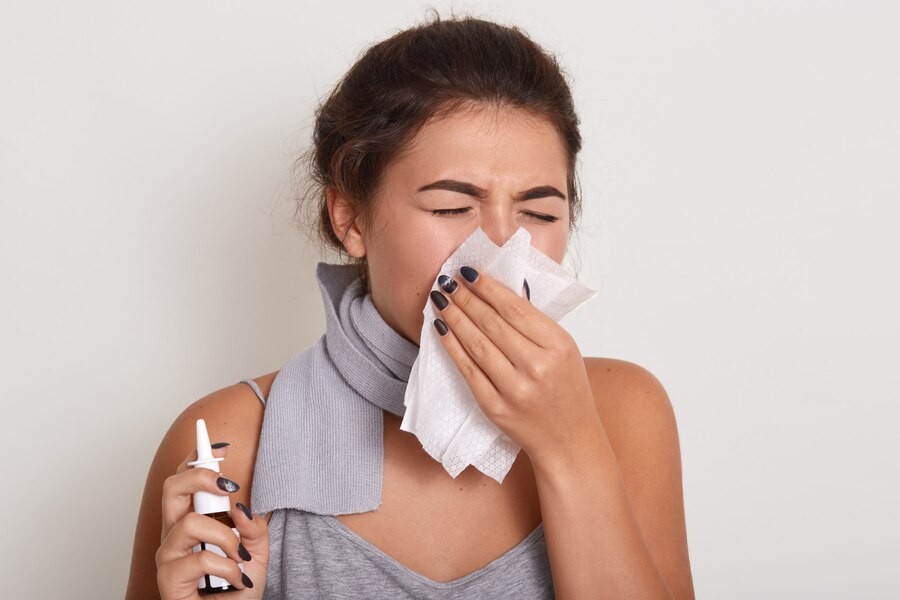Allergies are not selective and can affect individuals of all ages, including children. If you frequently observe your child experiencing itching, a runny nose, and sneezing, they might be dealing with allergic rhinitis. What are the symptoms, and what steps can be taken to manage them? Explore the detailed overview below.
What is allergic rhinitis?
Allergic rhinitis, commonly known as hay fever, manifests as an allergic response to airborne allergens such as mold, pet dander, or pollen from trees and plants. Upon inhaling these allergens, the body releases histamine, triggering symptoms like itchiness, swelling, fluid retention, and sinus inflammation.
This condition can occur either seasonally or throughout the year. It's particularly prevalent in young children, especially those with a family history of allergic rhinitis or asthma.
Symptoms of allergic rhinitis in children
The symptoms of allergic rhinitis can vary among children. Typically, a child may experience rhinitis symptoms affecting the nose, eyes, and ears. However, these symptoms can differ from one child to another. Common symptoms of allergic rhinitis may include:
- Persistent sneezing and nasal discharge
- Nasal congestion
- Itching sensations in the nose, throat, eyes, and ears
- Nosebleeds
- Headaches
- Body aches or fatigue
- Dark circles under the eyes
Children who experience allergic rhinitis throughout the year may also experience the following symptoms:
- Ear infections that go away
- Snoring
- Shortness of breath that requires mouth breathing
- Poor performance in school
- Having lines or folds in the nose due to the habit of rubbing the nose
Symptoms of allergic rhinitis in children are often confused with cold or respiratory distress. It is often difficult for parents to distinguish between the two. However, it is important to remember that fever or body aches typically accompany the symptoms of colds or respiratory problems.
Meanwhile, allergic rhinitis does not cause fever, and symptoms persist in the presence of allergens. If you have a cold, the snot that comes out is clear rather than cloudy.
How to treat allergic rhinitis in children
The most effective strategy for managing allergic rhinitis in children is to minimize their exposure to allergens. Identifying the specific allergen causing the reaction can help prevent allergic episodes in your child.
In addition, various medications are available to treat allergic rhinitis, including liquid or pill formulations, eye drops, injections, or nasal sprays. Some commonly used medications include:
- Antihistamines, which block the release of histamine during allergic reactions
- Decongestants are used to alleviate nasal congestion and sinus inflammation
- Corticosteroids, which reduce inflammation and swelling
- Leukotriene inhibitors target specific chemicals involved in allergic reactions
- Immunotherapy, a treatment that gradually desensitizes the immune system to allergens
If you need medical advice or consultation, you can either visit a doctor or make use of the consultation features that are available in the Ai Care application by downloading the Ai Care application from the App Store or Play Store.
Looking for more information about pregnancy, breastfeeding, and the health of women and children? Click here!
- dr Nadia Opmalina
Cedars Sinai. Allergic Thinitis in Children. Available from: https://www.cedars-sinai.org/health-library/diseases-and-conditions---pediatrics/a/allergic-rhinitis-in-children.html
John Hopkins Medicine. Allergic Rhinitis in Children. Available from: https://www.hopkinsmedicine.org/health/conditions-and-diseases/allergic-rhinitis-in-children#
Pediatric Allergic Rhinitis (Nasal Allergies). Available from: https://www.childrens.com/specialties-services/conditions/allergic-rhinitis
Nationwide Childrens. Allergic Rhinitis. Available from: https://www.nationwidechildrens.org/conditions/allergic-rhinitis-hay-fever











